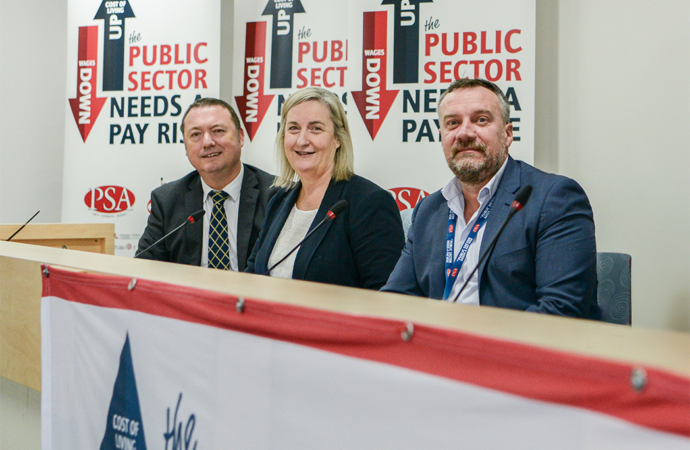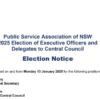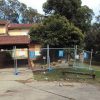The PSA CPSU NSW continues a great tradition of workplace victories.

Union members rarely see what goes into the wins that fundamentally transform their working lives.
They don’t see the meetings, strategising how to get the message across to members, government and the broader public. They aren’t party to phone calls, often on the weekend, between union executives and government ministers, or industrial officers and political staffers and senior public servants.
They don’t hear the vigorous debate, furious disagreements or the relief at reaching a decision amenable to all.
But the union members do see the wins. They see the better wages, the long-overdue offer of permanency, flexible conditions and safer workplaces.
They see what happens when their union fights for them.
In October 2024, a three-year pay deal was finally agreed on between the PSA and the State Government. The pay offer, the second handed down since the end of the previous government’s hated wage cap, delivered a series of pay rises that are expected to keep ahead of inflation.
“We ensured, when dealing with the Government over the pay increase, that there be safeguards if inflation once again starts eating into our spending power,” said PSA General Secretary Stewart Little. “If the Sydney Consumer Price Index exceeds 3.5 per cent in the March quarter in the second or third year of the deal. If this is the case, there will be negotiations for a one-off, non-cumulative, cost-of-living allowance.
“If the Sydney Consumer Price Index exceeds 4 per cent in the March quarter in the second or third year, members will receive a $1000 taxable, one-off, non-cumulative cost-of-living adjustment payment, plus superannuation.”
The recent pay deal was not simply the result of high-level chats and phone calls.


After years of protests, including a statewide strike and a protest march that filled Sydney’s Macquarie Street, the PSA took action. The union knew the Liberal National State Government would never repeal the wage cap, so it surveyed other parties and candidates for their opinions on members’ pay. They discovered Labor, the Greens and a plethora of independents and minor parties agreed with the union that the wage cap had unfairly reduced the spending power of the state’s vital frontline workers and that it had to go.
The politicians agreed Public Sector workers were the ones at the forefront of efforts to combat the appalling triumvirate of pandemic, fire and flood that had blighted the state in recent years.
The PSA went into action, campaigning for voters to choose candidates who were not happy with the status quo, where Public Sector workers were reminded their real pay was slipping further behind every time inflation figures hit the news.
With the wage cap gone, the union could truly begin to negotiate on salaries and win better wages and conditions for its members. The reason they could negotiate is that the PSA campaign to reinstate the Industrial Relations Commission was successful. Wages were no longer solely decided by the State Government.
For many in the union, the pay increases were more substantial. These areas had seen duties increase in complexity, yet their wages did not keep up.
In areas such as Community Services, the Office of the Sheriff, Fisheries, Special Constables and NSW Police Horses, wage increases were accompanied by uplifts that saw workers progress regrading scales that better reflect the work they do.

Wages are not the only benefit unions fight and win over. Last year saw thousands of workers in NSW public schools receive permanent positions. Until this win, the pupil population-based hiring system meant the school system was heavily reliant on non-permanent staff whose roles were renewed every year once student numbers were confirmed. Great for government bean counters, this system was awful for workers. Many languished in this employment limbo for years, always fearful the Christmas break would signal an end to their working life.
“I’ve worked in the school system for decades, so I know how distressing it was for members not knowing if they were employed the following year,” said PSA Senior Vice-President and Chair of the Schools Departmental Committee Juliette Sizer. “This problem was particularly acute in the regions, where small population sizes meant members’ jobs were vulnerable.


“Our union has been campaigning on this issue for years. And we didn’t let up, so much so that before the most recent state election, both sides of politics were promising to fix this issue.
“You want to know what a winning union looks like? Ask our members in schools. They know.”
The victory of excessively precarious employment was the second big win in this area as the PSA pursues its goals of Paid, Protected, Permanent. In 2019, members in schools received a big pay increase after the Industrial Relations Commission found the low pay in the sector was due to sexual discrimination.

“We are now looking to reduce the violence meted out to our members in schools,” said Ms Sizer. “Then we truly will be Paid, Protected, Permanent.”
Another long-running issue the PSA is taking on is the commercial operation of gaols, with the government takeover of Junee Correctional Centre a recent development in the public-private arm wrestle over control of NSW prisons.
“As a Prison Officer, I know incarceration for profit will never work,” said PSA President Nicole Jess. “Cutting costs to boost profits benefits no-one but bosses and the overseas shareholders of these outsourcing behemoths.
“It’s bad for the staff, bad for the inmates and bad for the public that expects our prisons to properly rehabilitate people found guilty of crimes.
“The handover of Junee to Corrective Services NSW means staff will be safer and better paid. They will be part of the wider correctional system, so will have better access to promotion and career advancement.
“Our union is excited about this change of ownership and will be keen to see this occur again when contracts to run and operate private gaols in Parklea and the Clarence region are up for renewal.”
The PSA has long opposed the private operation of what are usually public assets, including Junee, that characterised NSW politics for much of the past decades. The union also knows the NSW public shares its distaste for the sell-off of state assets and services.
“We campaigned heavily during the 2023 state election on this issue,” said Mr Little. “We got great traction on this. Voters, including conservative party supporters, have never been on board with privatisation. Our Privatisation Hurts Everyone campaign was a winner with voters, articulating how they felt seeing profiteering from assets they, as taxpayers, once owned.
“It was a major reason many people abandoned the Liberal National Government in favour of parties that had promised to stop the sell-offs.”
Campaigning was also a big part of publicising the plight of the state’s child protection system.
“The NSW system for children requiring state intervention in their care was perhaps the most insidious example of outsourcing,” said Mr Little. “Private operators were charging obscene amounts, yet an underfunded state-run service was struggling to see even half the children requiring help.

“Our Child Protection in Crisis campaign showed NSW what was going on. And the state did not like what it saw.
“PSA staff travelled the state, doing media appearances and demanding more be done to protect some of our most vulnerable children. There is still much to be done. But we have a Minister who regularly visits the PSA to hear what our members have to say. The Government has hired more Caseworkers, and the recent uplift that accompanied the pay rise will hopefully see a slowdown in the number of them leaving the job.
“The PSA is not only winning for these members, it is winning for the children whose lives depend on our services.”
Allison Corrigan, PSA Vice-President, said the union’s actions have also helped the Child Protection Helpline service which is also under crisis.
“Delegates have been able to provide grassroots support 24/7, which is important at what has been an unprecedentedly challenging time,” she said. “When we have a 24-hour service, it is vital members can reach out at any time, no matter the hour.
“Some members feel the PSA is all they have in the workplace.”
Assistant General Secretary Troy Wright said, due to the nature of members’ roles, the PSA’s wins have a much wider impact that simply better-paid and happier workers.
“We run things like child protection services, prisons, schools, TAFE campuses and national parks,” he said. “When our workers get better pay and more respect, this flows on to the very functions that make our state a superior place to live, learn and work. If employers treat Disability Support Workers well, for example, then some of the state’s most vulnerable residents will get the best care. Not only are these people happier, but their family members can rest easier, too.
“In the justice system, the PSA has campaigned hard, and won, on behalf of some of the state’s most undervalued workers.
“We saw significant uplifts for Sheriffs, Special Constables and the Grooms who care for Police horses.
“In these workplaces we had been fighting for years, walking off the job and getting maximum media coverage for these workers’ plights.”
Sheriffs have walked off the job all over the state to draw plight to their issue. Several years ago, Special Constables did the same, including walking away from duties at State Parliament, drawing attention to their working conditions to the decision-makers they protect.
“The uplifts will improve these workers’ wages and conditions,” said Mr Wright. “This will improve services for the people of NSW.”
PSA CPSU NSW Vice-President Shelley Odewahn has worked in the university sector for more than 20 years.
“The CPSU NSW is constantly involved in Enterprise Bargaining for our members in universities,” she said. “Every win we get improves the service delivered from the Professional Staff we represent in the state’s 11 universities.
“Education is not only the foundation for a better-trained future workforce; it is also one of the country’s biggest export earners. Wins for members equate to wins for the Australian economy. It’s that important.
“We have won conditions in Enterprise Agreements that you would struggle to find elsewhere in the country’s industrial landscape, including gender-reassignment leave and cultural leave.
“Don’t forget, it was in the universities sphere that our union first won domestic and family violence leave 20 years ago. This is now a global employment condition that has saved countless lives.”
Wins for the union can equate to wins in the state’s social fabric. The domestic and family violence leave mentioned above means those suffering domestic and family violence are not forced to remain in what can be potentially fatal living conditions. The leave has been adopted in Awards and Enterprise Agreements throughout Australia and is now an international labour standard.
Additionally in this area, the PSA launched a campaign to keep open the Mount Druitt Domestic Violence Support Unit, the only government-run facility of its kind in the state. Slated for closure, the centre was kept operational, with more staff and a more realistic budget thanks to a campaign by the union. The PSA is now campaigning for similar centres to be opened throughout NSW.
“Everyone in the state should have access to government-funded domestic and family violence support,” said Ms Jess.
Wins are often the result of the union better responding to changes in members’ work life.
“Our Fisheries Officers recently received an uplift from the State Government after years of campaigning from their union, the PSA,” said Mr Wright. “This better reflects their role in NSW.
“The days where an Officer’s job was checking someone didn’t have too many undersized whiting in their bucket have gone. Organised crime has moved into seafood poaching, while drug smugglers are using fishing vessels.
“This means previous wages and conditions were no longer suitable for what is now a totally different role for these Champions of the State.”
The PSA CPSU NSW has once again grown to more than 40,000 members. This has occurred at a time many other unions in Australia have contracted in size.
“We grow because we campaign, fight and win,” said Mr Little. “There can be no greater advertisement for joining your union than seeing wages, conditions and workplace protections improve.
“Winning unions are growing unions. It’s that simple.”
















Leave a Comment
Your email address will not be published. Required fields are marked with *